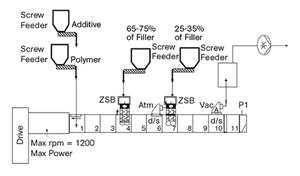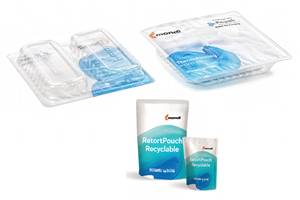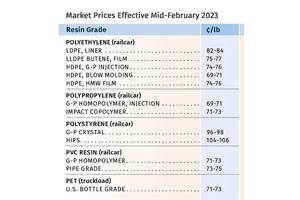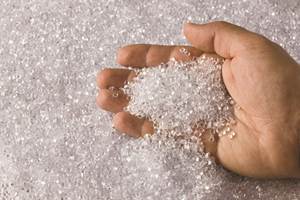First Business Accelerator For Solutions To Plastic Pollution
NewGen Surgical is one of the initial businesses in the new Accelerator portfolio, each having developed a "groundbreaking" technology to reduce plastic pollution.
Last month, I had the opportunity to attend the third annual Plasticity Forum at NYC’s Tribeca Rooftop which aims to share the wealth of knowledge from the leading edge of those who are facilitating a world where plastic is used, but without the footprint.
According to Douglas Woodring, founder of Plasticity Forum, Ocean Recovery Alliance, this means all of the benefits of lightweighting, durability, flexibility, and color, without the “hangover”, referring to plastics pollution. As in the first two forums held in Rio and Hong Kong, Plasticity brings together the leaders in innovation, design, packaging, materials, recycling, and solutions—all needed in a resource-constrained world, says Woodring.
One of several interesting presentations was made by Destin Layne, a founding partner and COO of Think Beyond Plastic Accelerator, Inc., reportedly the world’s first business accelerator for solutions to plastic pollution through innovation and entrepreneurship. It was first launched at U.S. Secretary of State Kerry’s Conference on the Oceans and at Plasticity 2014.
Described as a public benefit corporation, it was created to inspire and incubate entrepreneurship; to accelerate early- and mid-stage businesses with a proven business model, a solid management team and an innovative solution to plastic pollution, and to provide pre-qualified opportunities for investors and brands—all with a focus on sustainable, non-toxic and healthy alternatives to the current disposable plastic products. Think Beyond Plastic’s executive team has a blended experience in innovation, entrepreneurship, science, sustainability, major brand management and repositioning, and early stage business finance. The initial group of businesses in the Accelerator portfolio—each with “groundbreaking technologies” reducing plastic pollution-- include Plastipure, PulpWorks, Aspenware, and NewGen Surgical.
I had the pleasure of talking with Rob Chase, president of California-based NewGen Surgical on their newly launched NGS35W Skin Stapler, which appears to be the most environmentally sustainable option in the current market of single-use skin staplers.
Other skin staplers on the market are typically made with, for example, Cycoloy PC/ABS from Sabic Innovative plastics. Using its Smart Sustainable Design, NewGen Surgical developed the new device with 69% plant-based material. More specifically, the body of the device (handle/lever) is made of bagasse, the fibrous matter that remains after sugarcane or sorghum stalks are crushed to extract their juice. Chase notes, “By resourcing bagasse, we have achieved a 67% reduction in energy used for production of the skin stapler’s material compared to the same product made of 100% plastic.”
Chase shares that the product is made using a wet thermoforming process. The material, which comes in a slurry form, is placed into the mold where the water is pressed out, then air dried into its rigid shape. “We use the medical grade PC/ABS in the part of the skin stapler that delivers the surgical stainless-steel staples. Physicians can expect the same clinical performance as the all-plastic skin staplers, as well as ergonomic design, tactile feedback when the firing cycle is complete, an alignment indicator for accurate staple placements, and an easy-to-see staple remaining indicator.
NewGen Surgical’s sustainability efforts also extended to the use of single-plastic packaging for the device—HDPE makes up both the tray and lid of the package. The company is now focusing on similar sustainable solutions for other medical single-use devices that are not reprocessed, but end up in landfills or incineration.
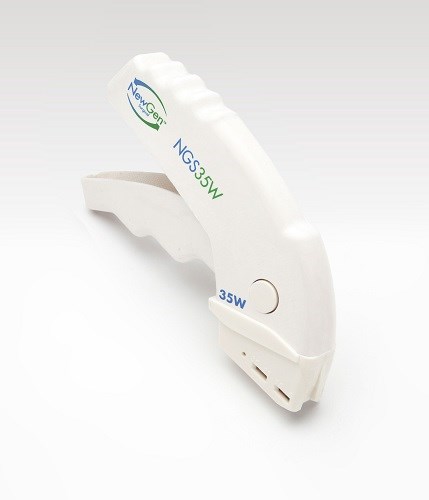
Want to find or compare materials data for different resins, grades, or suppliers? Check out Plastic Technology’s Plaspec Global materials database.
Related Content
Improving Twin-Screw Compounding of Reinforced Polyolefins
Compounders face a number of processing challenges when incorporating a high loading of low-bulk-density mineral filler into polyolefins. Here are some possible solutions.
Read MoreIn Sustainable Packaging, the Word is ‘Monomaterial’
In both flexible and rigid packaging, the trend is to replace multimaterial laminates, coextrusions and “composites” with single-material structures, usually based on PE or PP. Nonpackaging applications are following suit.
Read MoreFirst Quarter Looks Mostly Flat for Resin Prices
Temporary upward blips don't indicate any sustained movement in the near term.
Read MoreFundamentals of Polyethylene – Part 3: Field Failures
Polyethylene parts can fail when an inappropriate density is selected. Let’s look at some examples and examine what happened and why.
Read MoreRead Next
Precision Processing Requires Precision Equipment
Moretto offers plastics processors and micromolders for a broad suite of auxiliary solutions targeted specifically for precision processing.
Read MoreFor PLASTICS' CEO Seaholm, NPE to Shine Light on Sustainability Successes
With advocacy, communication and sustainability as three main pillars, Seaholm leads a trade association to NPE that ‘is more active today than we have ever been.’
Read MoreSee Recyclers Close the Loop on Trade Show Production Scrap at NPE2024
A collaboration between show organizer PLASTICS, recycler CPR and size reduction experts WEIMA and Conair recovered and recycled all production scrap at NPE2024.
Read More



















